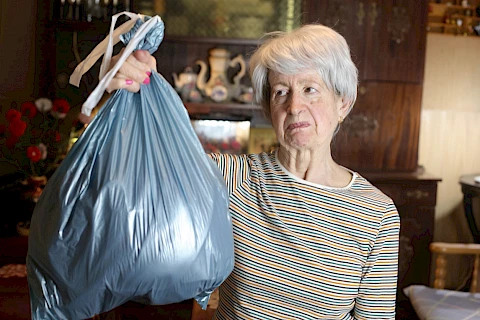
Hoarding is a serious issue that affects many seniors, often posing significant safety risks. As our loved ones age, they may develop tendencies to collect and keep items beyond what is practical or safe. This behavior can lead to cluttered living conditions that put their well-being at risk. Senior Helpers Palm Coast will explore hoarding in seniors, its potential dangers, and proactive steps caregivers can take to ensure a safer living environment.
Hoarding in Seniors
Hoarding is the persistent difficulty in discarding or parting with possessions, regardless of their actual value. Several factors can lead to hoarding among seniors, including emotional attachments to items, fear of losing memories, and anxiety or depression. Recognizing the signs of hoarding can help caregivers address the problem early. Some indicators include cluttered living spaces, difficulty moving through the home, and reluctance to remove items.
Safety Risks Associated with Hoarding
Hoarding creates several safety hazards that can jeopardize the health and well-being of seniors. Increased fall risks are a major concern in cluttered environments. Crowded walkways and rooms make movement difficult, leading to a higher risk of falls and injuries. Additionally, difficulty accessing areas like the bathroom or kitchen can restrict a senior's ability to perform daily tasks safely.
Fire hazards are another risk associated with hoarding. Blocked exits and pathways make it challenging to evacuate during emergencies. The accumulation of flammable materials like papers and fabrics also increases the risk of fire, putting seniors in danger.
Unsanitary conditions develop in hoarded spaces. Pests such as rodents and insects are attracted to clutter, leading to infestations. Mold and mildew can thrive in unclean environments, posing respiratory and other health risks. Furthermore, accumulated waste can become a breeding ground for bacteria, creating additional health hazards.
Checklist of Safety Concerns to Address
Addressing hoarding-related issues requires a comprehensive approach. Here's a checklist to guide you:
- Clear walkways and living spaces: Ensure paths are clutter-free to prevent tripping hazards.
- Ensure access to emergency exits: Ensure doors and windows are not obstructed.
- Regularly dispose of trash and perishable items: Reduces pest attraction and unpleasant odors.
- Check for and address pest infestations: Regular inspections can help identify and eliminate pests early.
- Inspect for mold and mildew: Regular cleaning and proper ventilation can prevent mold growth.
Tackling hoarding is often beyond the scope of what family members alone can handle. Involving professionals can make a significant difference. Therapists and mental health professionals can address the underlying psychological issues, which is crucial for a long-term solution.
Specialized cleaning services offer expertise in safely clearing and organizing clutter. Local support groups and resources can provide additional support and guidance, helping caregivers navigate this challenging situation.
Contact Senior Helpers for Personalized Care Services
Hoarding can pose serious safety risks for seniors, but caregivers can take proactive steps to mitigate these dangers. By addressing clutter, ensuring safe pathways, and involving professionals, you can create a safer living environment for your loved ones. If you're in Palm Coast, Bunnell, Flagler, St. Johns, or St. Augustine, contact us at Senior Helpers Palm Coast for professional senior care services and support.